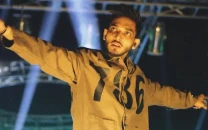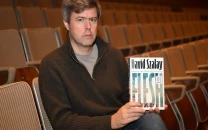We’ve never signed a written contract for ‘Bulbulay,’ we work on word of mouth: Ayesha Omar
Actor discussed stardom, social advocacy and her journey of healing after an abusive relationship
1704291961-0/Screenshot-(359)1704291961-0-640x480.webp)
While many television shows enjoy enthusiastic public reception, few go on to become a distinct household name with a successful run for 14 years and no signs of stopping. Hitting the small screen in 2009, Bulbulay is one offering that has found dedicated fans all over the country.
Talking about the widely-loved family sitcom, actor Ayesha Omar delved into her long experience working with Bulbulay’s team and how the show catapulted her to fame. Ayesha graced the couch at The Talk Talk Show on Express Entertainment with host Hassan Choudary for a candid interview, where she discussed personal life, showbiz, social advocacy and of course, Bulbulay.
Rise to fame
Longtime fans of the celeb can recall her time at MTV Pakistan where she found popularity as a VJ. However, Ayesha credits Bulbulay as the milestone that made her a public darling. Essaying the role of Nabeel’s wife Khoobsurat with her trademark refrain “shut up, Nabeel,” Ayesha remarked on how the sitcom’s audience cuts across the board and earned her fans of every age and class.
When asked about her long commitment to the show, the Habs actor revealed that she tried to leave the show after 26 episodes. “I tried a lot to quit because my mother hated the show…she would say you are doing such a pathetic show,” Ayesha disclosed. The actor discussed how her mother felt that Bulbulay was a waste of her daughter’s quality education and hard work.
If not for co-actor and producer Nabeel who predicted that the sitcom would become Ayesha’s identity one day. True to his word, the model shared how Bulbulay eventually charmed her mother as well who now recognises her work as a service to public.
Delving deeper into the heartfelt camaraderie the sitcom’s team has built over the years, Ayesha divulged how none of the actors have ever signed contracts, binding them to continue. “We’ve never had a written contract for Bulbulay. We work on word of mouth because we trust each other,” she offered.
Debunking myths
Veering toward a more serious topic, Ayesha recounted a difficult time in her life when she found herself in an abusive relationship. The actor underlined the importance of sharing her story, stating, “We (celebrities) are human beings. There are good and bad things happening in every person's life. And if someone can learn from my story, get inspired, or make a hard decision that they cannot make, man or woman, so why not [talk about it]? I have a platform.”
While many recognise the power and promise of strong women like Ayesha amplifying pervasive social issues such as domestic violence, the same platform can activate a whole new host of stereotypes. The celeb rejected the oft-held assumption that women in positions of power or influence are immune to domestic violence.
Discussing critics who question how a “blunt” and “independent woman” like Ayesha found herself at a disadvantage, the actor acknowledged her youth as one factor to shed light on complex dynamics of an abusive relationship.
“And it wasn't that it was constant physical abuse. There were instances,” she remarked, echoing many other survivors. Abusive partners frequently resort to empty promises to change, giving their partners false hope. She furthered on, “And then the person would apologise and say, it won't happen again but it would. So it was an ongoing process.”
One myth about abusive partners paints them as perpetually violent. However, Ayesha was quick to correct that this is not always the case, a pattern that makes domestic violence only more insidious and damaging, not less.
“It wasn't that I was married and that I was getting beaten up every day,” the star pointed out how she wasn’t always in close quarters with her partner, unlike a married couple. “And thank God I wasn't married. I escaped that because we would’ve gotten there. We were very close to marriage.”
Understanding survivors of domestic abuse
As per Ayesha, pivotal to this experience was her childhood and upbringing in the absence of a father. She criticised how society mocks women who have a problematic or absent relationship with their father. Phrases like “daddy issues” are commonly invoked to minimise what Ayesha contends is “a very traumatic” experience.
“When there’s no male role model in your life to see, you don't understand how a man should behave with you, what you should accept and what you shouldn’t,” Ayesha identified the ways a missing paternal figure impacted her. “So when you have not seen your parents' relationship, how your father treated your mother, you don't know how a man treats a woman.”
The actor elaborated on how this lack can distort a woman’s understanding of her partner’s abusive patterns, making her think his attitude is normal. “I believed it, that maybe this is love, this is passion and this is emotion,” Ayesha admitted.
Financial independence is the most important factor in escaping such a destructive relationship according to the former VJ. Ayesha discussed how hard it can be for women who rely on their partners financially to even envision an escape route. Ultimately, when the choice comes down between enduring abuse and risking food and housing for their children, many women cease to protest.
Have something to add to the story? Share it in the comments below.



















COMMENTS
Comments are moderated and generally will be posted if they are on-topic and not abusive.
For more information, please see our Comments FAQ